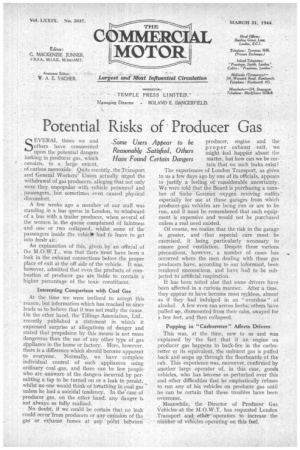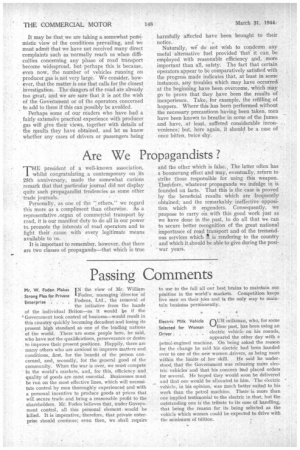Potential Risks of Producer Gas
Page 15

Page 16

If you've noticed an error in this article please click here to report it so we can fix it.
SEVERAL times we and others have commented upon the potential dangers lurking in producer gas, which consists, to a larRe extent, . of carbon monoxide. Quite recently, the Transport and -General Workers' Union actually urged the withdrawal of gas producers, alleging that not only were they unpopular with vehicle personnel and passengers, but sometimes even caused physical discomfort.. few weeks ago a member of our staff was standing in a bus queue in London, to windward of a bus with a trailer producer, when several of the women in the queue complained of faintness and oneor two collapsed, whilst some of the passengers inside the vehiclt had to leave to get into fresh air.
An explanation of this, given by an official of the M.O.W.T., was that there must have been a leak in the exhaust connections before the proper place of exit at the off side of the vehicle. It was, however, admitted that even the products of combustion of producer gas are liable to contain a higher percentage of the toxic constituent.
Interesting Comparison with Coal Gas _ At the time we were inclined to accept this reason, but information which has reached us since leads us to believe that it was not really the cause. On the other hand, the Tillings Association, Ltd., recently published a statement in which it expressed surprise at allegations of danger . and stated that propulsion by this means is not more dangerous than the use of any other type of gas appliance in the home or factory. Here, however, there is a difference which should become apparent to everyone. Normally, we have complete individual control of such appliances using ordinary coal .gas, and there can be few *people who are unaware of the dangers incurred by permitting a tap to be turned on or a leak to persist, whilst no one would think of brtathing in coal gas unless he had a suicidal tendency. In the'case of producer gas, on the ,other hand, any danger is not always so fully realized. .
No doubt, if we could be certain that no leak could occur-from producers or any emission of the gas or eXhaust fumes at any point between producer, engine and the proper exhaust exit, we might feel happier about the matter, but how can we be certain that no such leaks exist?
The experiences of London Transport, as giVen to us a few days ago by one of its officials, appears to • justify a feeling of considerable uncertainty. We were told that the Board is purehasing a number of Siebe Gorman oxygen reviving outfits especially for use at those, garages from which producer-gas vehicles are being run or are to be run, and it must be remembered that such equipment is expensive and would not be purchased unless a real need existed.
Of course, we realize that the risk in the garage is greater, and • that especial care must be exercised, it being particularly necessary to ensure good ventilation. Despite these various precautions, however, a number of cases has occurred where the men dealing with these gas producers have, according to our informant, been rendered unconscious, and have had to be subjected to artificial respiration.
It has been noted also that some drivers have been affected in a curious manner. After a time, they app'ear to have become most reckless, almost as if they had indulged in an "overdose " of alcohol. A few even ran across kerbs; others have pulled up, dismounted from their cabs, swayed for a few feet, and then collapsed.
Popping in "Carburetter" Affects Drivers This was, at the time, new to us and was explained by the fact that if an engine on producer gas happens to back-fire in the carburetter or its equivalent, the unbnrnt gas is puffed back and seeps up through the floorboards of the . cab. This experience was, moreover, confirmed by another large operator of, in this case, goods vehicles, who has become so perturbed over this and other difficulties that he emphatically refuses to run any of his vehicles on producer gas until he can be certain that these troubles have been overcome.
• Meanwhile, the Director of Producer Gas Vehicles at the M.O.W.T. has requested London ,Transport and othet -operators to increase the niuriber of vehicles operating on this fuel. It may be that we are taking a somewhat pegsi.mistic view of the conditions prevailing, and we must admit that we have not received many direct complaints such as normally reach us when difficulties concerning any phase of road transport become widespread, but perhaps this is because, even now, the number of vehicles running on producer gas is not very large. We consider, how , ever, that the matter is one that calls for the closest investigation. The dangers of the road are already too great, and we are sure that it is not the wish of the Government or of the operators concerned to add to them if this can possibly be avoided.
Perhaps some of our readers who have had a fairly extensive practical experience with producer gas will give their views, together with details of the results they have obtained, and let us know whether any cases of drivers or passengers being harmfully affected have been brought to their notice.
Naturally, we' do not wish to condemn any useful alternative fuel provided That it can be employed with reasonable efficiency and, more important than all, safety. The fact that certain operators appear to be comparatively satisfied with the progress made indicates that, at least in some instances, any troubles which may have occurred at the beginning have been overcome, which may go to prove that they have been the results of inexperience. Take, for example, the refilling of hoppers. Where• this has been performed without the necessary precautions having been taken, men have been known to breathe in some of the fumes and have, at least, suffered considerable inconvenience; but, here again, it should be a case of once bitten, twice shy.




















































